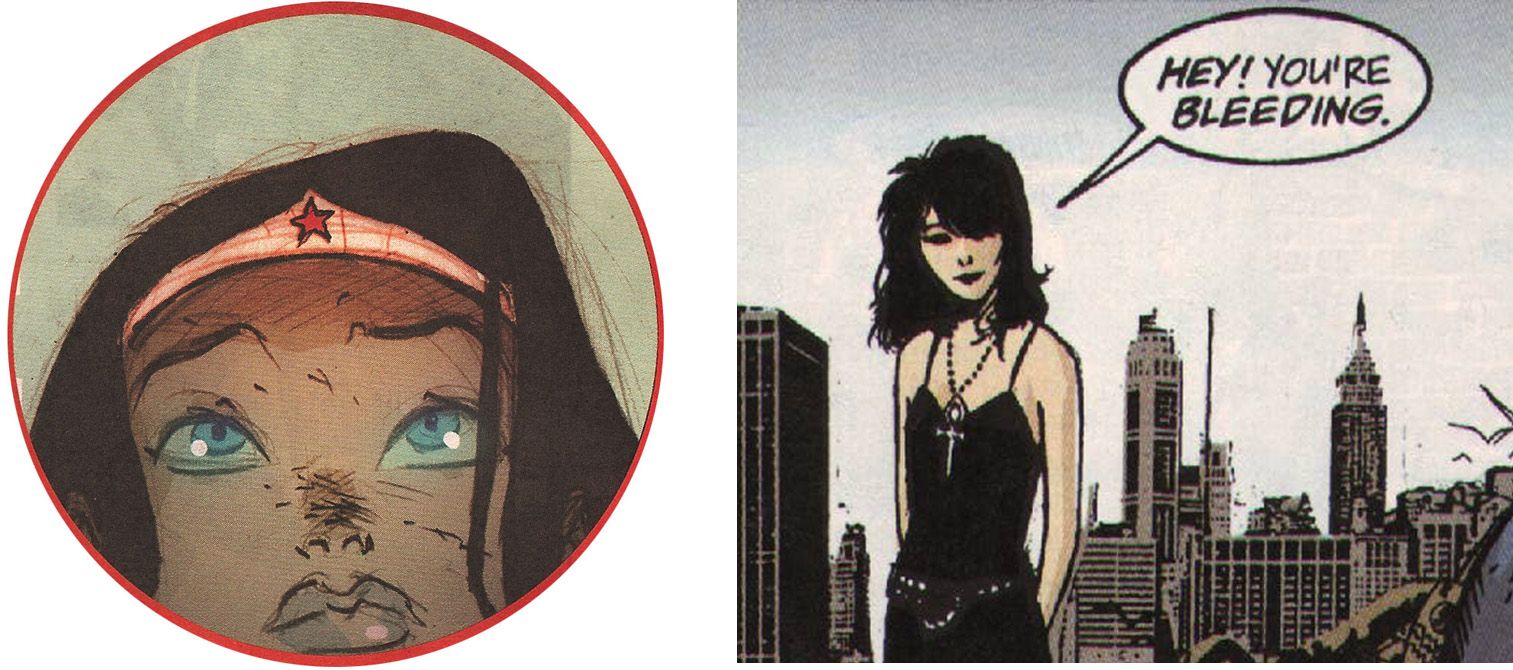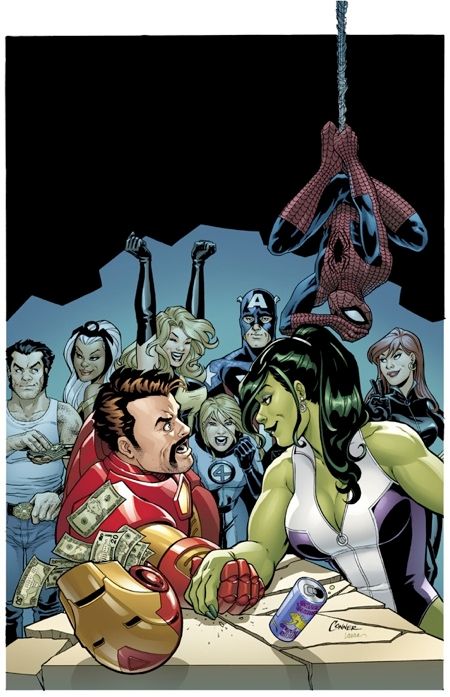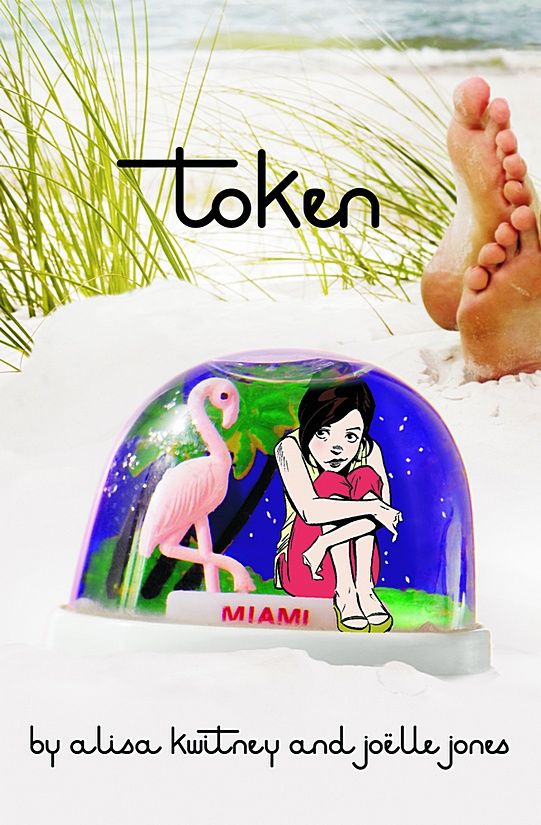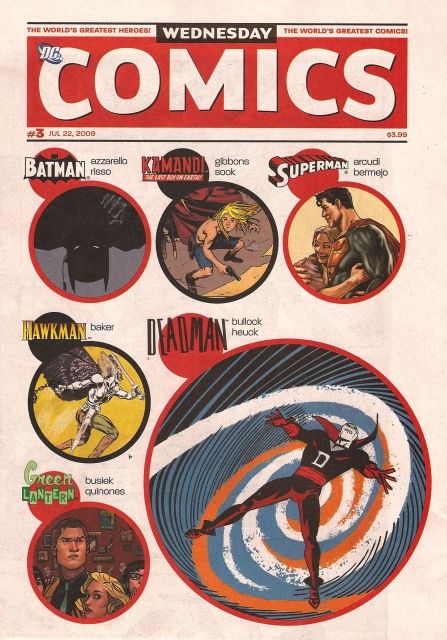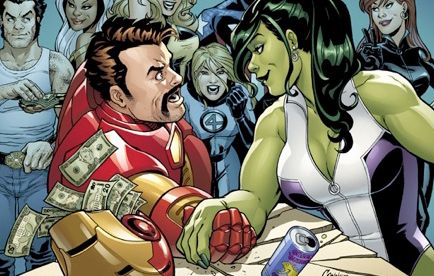I knew I needed to talk about GIRL COMICS in today’s column considering what this column is about and
the fact that GC is one of the biggest mainstream ‘women in comics’ announcements since the announcement of MINX in 2006. However, I wasn’t sure if I had anything unique to add to the discussion. I felt like between the columnists, bloggers, critics, and fans the subject had been just about beat to death. And then, in one of the many articles I read, I stumbled across a comment that seemed particularly insightful and distinctly more positive than my outlook. The comment came from IDW editor Mariah Huehner, who is currently working on IDW’s ANGEL and in the past has worked on such heavy hitters as FABLES, SANDMAN: ENDLESS NIGHTS, and the MINX line. Considering Huehner’s experience in the industry and most especially her involvement with MINX I thought she would be the perfect person to talk to and someone that could perhaps bring me around to her more optimistic point of view.
Luckily for all of us, she agreed to my little experiment. The following are the highlights of our discussion this past Thursday.
Kelly: Hi Mariah. Let me start off by saying thank you for taking the time to speak with me.
Mariah: Of course, thanks for asking me.
Kelly: So without question I am completely excited about GIRL COMICS. It's impossible to not be excited to see that much talent (female or otherwise quite frankly) crammed into an anthology. And the cover? Forget about it...one of the best covers I've seen in a long while. However, I do think it sends a pretty dangerous message, both because of what it is, and because of the way the industry is already skewed (very exclusionary to women) and I think I am just feeling kind of 50,000 times burned, now shy.
Mariah: That's understandable. I think we’ve all been burned a few times by now.
Kelly: I don't think MARVEL is necessarily setting the book up to fail so that they can say "Hey look! Girls don't read comics!" but I do think they tend to default to that setting when books don't do well, rather than examining maybe what went wrong in any number of ways on their end. But you seem more optimistic...so set me straight!
Mariah: Well, I think there are a few factors to consider. I certainly think that part of the fandom and especially those outside the industry often leaps to the conclusion that women don't read comics, because it's become an ingrained assumption. It's not reality, but the accepted status quo. And I think publishers have to struggle with that problem all the time. How far do you stray from your "core" without alienating them, what is the core, etc. The fact that MARVEL is doing this at all strikes me as a very positive acknowledgment that, regardless of what is often said, they know women are reading their books. They know they're creating them, editing them, being a part of it at every level. I see this as a showcase more than anything else.
Kelly: But it just feels so gimmicky and PR market stunt-y. It would feel like a showcase to me if any of these women worked at MARVEL with any regularity. But with a couple exceptions they just don't...and so it ends up feeling like they're being given a "special" project and the women on the book will just go home after their three issue run. Which doesn't feel like change...and it almost feels like MARVEL using them and us. And I don't know what kind of success the book would have to have (which is really rare for minis) for a few of those women to come away with ongoing book offers or something similar (assuming they'd want them).
Mariah: I think many of them have worked for MARVEL over the years, and some of it is whether or not they've been interested in telling a story there before. I mean, yes, there's an element of a gimmick to it. Just like there is whenever you showcase any creator. You try to sell people on what about it makes it different or appealing in some way. But based on the interview, and the people involved, it doesn't feel like "using" to me. It feels like effort. And one that isn’t often made.
Kelly: I think you said something really key there, that – ‘the effort isn’t often made’ I think that's what gets me - I feel somehow both grateful and also resentful that I have to be grateful that an offer is being made. Bit of a slippery slope.
Mariah: Sure. And hopefully at some point it won't be. But it has to start somewhere. I think there's also something at play here that often happens anytime something is specified as "by" women or "for" women. Which is that it ends up shouldering everyone's desires, needs, and hopes for it. Everyone wants it to be "the" thing that fixes it, or that appeals to all women, or that addresses every issue, or whatever, and that's pretty much impossible.
Kelly: I agree. There is often too much pressure put on books (etc.) like this and it's impossible to meet all expectations. Almost like it's destined to fail.
Mariah: I don't think it has to be…I think we sort of expect it, because a lot of things have. But a lot of things have succeeded, too. We just don't really talk about that as much, and because we don't get that many opportunities to see these things, it all gets heaped on. MINX had a similar issue.
Kelly: Yeah, I'd really like to hear your thoughts on MINX since you were involved and because I think MINX is something MARVEL could have really learned from, and judging from what we’ve seen so far I'm not sure they did.
Mariah: Well, MINX was a very ambitious endeavor. I worked on the first few titles in its very beginning stages. The idea was to do stories a bit like independent films. Not quite the mainstream, a little odd, a little strange, for the girl reader who maybe doesn't quite know what to think about mainstream comics. It was meant to mirror a lot of what you see in YA lit.
And try and reach an audience, teen girls, who are not always acknowledged. And if they are, everyone assumes they're just reading Manga.
Kelly: You know, I read most of the MINX books, I think 10 out of the 12, and I can see the concept you’re suggesting actually executed quite well - I think if that is what they set out to do - independent films/YA lit - they pretty much nailed it. I just think that much like independent film (unfortunately) there wasn't enough crossover appeal, in this case to a little bit older girls/women, or to boys much of any age.
Mariah: I don't think they were worrying too much about boys. They weren't trying to exclude them or anything, but the idea was definitely to reach teen girls.
Kelly: Sure, sure. The thing I could never figure out about MINX is why there were no superhero books.
Mariah: I don’t think they were interested in doing superhero stories, because that's really DCU territory. And MINX was developed by a Vertigo editor. So the editorial perspective was different.
Kelly: But that makes no sense to me. You want a gateway drug of sorts that lures girls/women into comic books (or stores) and maybe hopefully they see other superhero DCU stuff etc and now they’re in…now girls are buying “regular” comics beyond MINX. But they didn't do any great superhero stuff that would appeal more to girls and aid them in crossing over. I think a lot of girls would like superhero stories and simply don’t know it because they haven't been exposed to it. And there are a lot of superhero books that feel exclusionary to young girls so it’s hard to get in. Which is not to say that MINX should have been all superhero, definitely not, but I think a great female relatable superhero book could have helped immensely.
Mariah: Well, the intent wasn’t necessarily to create crossover in quite that way. It was to get them interested in MINX. It was considered very separate. I personally think that adding more genres would have been great.
Kelly: Then I guess I wish they'd just had more time/money. Because I just don't know how they thought it would succeed overnight.
Mariah: I'm not sure they thought it would, exactly. It was a bit of an experiment in that way. Not that I know all the intentions or anything, but, I think the goal was to see if they could reach an audience they knew was reading YA lit.
Kelly: Because how would a young girl that doesn't frequent comic shops even know about them? I know there was some discussion about getting them into the YA section of bookstores...
Mariah: There was a hiccup there from what I understand, although that was way after I’d left. It seems like a lot of it was access. They wanted to reach the book store crowd, those reading Manga, and new readers to the comic form. They did a lot of marketing on it. I don't know all the results, but there was a reason they were going for that audience.
Kelly: Yeah, but again, that seems incredibly naïve to me. Access definitely could have helped but I just think they were thinking too small...because and this comes back around to what Jeanine Schaefer said in her interview about GIRL COMICS and I think you similarly echoed it by talking about "core audience". Jeanine said..."Whenever you see a large concentration of women reading one series in particular, it’s less that there’s something specific there that women gravitate towards and more that they’ve found something that doesn’t have an implied sign on it saying 'no girls allowed'".
Mariah: I'd agree with Schaefer wholeheartedly. I’m not sure it was naïve, though. DC has had a lot of success in the book market, and there are quite a lot more readers in general for prose.
Kelly: But I think the core audience is not really what they think it is. I think if they could soften the sexism and focus more on bringing in a few stronger female characters (and creators) I think they'd be surprised how much more superhero stuff would appeal to the masses.
Mariah: I think it's more than that, though. Because superheroes are a genre, not the medium. You have to get people interested in the medium before you can get them into the genres. It's a lot easier to introduce someone to comics if you use a genre they're already into, like horror. Especially if you consider how radically different comics storytelling is. Unless you've been introduced to it young, or gotten into it on your own, it can be intimidating. And the reality is, in the mainstream, most people still assume superheroes are comics. Not a genre, but the medium itself.
Kelly: You're right about the confluence between comics and superhero…for most people comics = superheroes.
Mariah: Plus, I do think more people would like comics if they realized they come in all shapes and sizes and that they don't all have capes and tights.
Kelly: It's true. There are a lot of myths out there that keep comics locked onto a path that I unfortunately think is slowly killing the medium.
Mariah: You give someone FUN HOME who's never read a comic before, and they go, ‘Oh! You can do this?’ And actually, that's what encourages me about the women in the GIRL COMICS lineup. Most of them already have crossover appeal.
Kelly: As a woman you almost have to.
Mariah: Hence why, until I actually see the stories and they prove otherwise, I'm optimistic. These are all great storytellers. Jill Thompson, Trina Robbins, Amanda Conner, Colleen Coover etc...it's quality stuff.
Kelly: I think the stories are going to be great. I think they're going to be so great that I'm going to cry when it's over and I have to go back to 'business as usual' that's my whole problem.
Mariah: My hope is that this will be one step towards changing that. The reality is, it's going to be a struggle.
Kelly: One thing that does give me hope as far as the actual content of GIRL COMICS is concerned is WEDNESDAY COMICS…I know you're not a big superhero reader but did you read WEDNESDAY COMICS
this summer?
Mariah: I didn't, actually.
Kelly: Well, it was some of the best stuff I've read in a long time. And I feel like Mark Chiarello's approach was almost identical to how Schaefer apparently approached these women creators i.e. "if you could do anything, what would you do?" And in WEDNESDAY COMICS it produced some of the most interesting, thoughtful, and surprising stories I’ve read. So I'm hopeful in that way...in the way that Chiarello/DC was able to produce an environment for creators to really go at it with something they love that Schaefer/MARVEL will be able to get the same strong results.
Mariah: That's what I'm hoping. Schaefer’s interview was so intelligent and thoughtful and echoes what so many women I know in the industry have been saying, for years. I think there is always a bit of resentment when it feels like women are being told what they'll read, why they'll read it, or that we'll only read things by women because of some sisterhood connection. But that's not the impression I got from this at all. Schaefer seems very aware of all the pitfalls.
Kelly: Well that's my point also...the whole "what they'll read thing..." I feel like they (the Big Two) are constantly pulling out their hair trying to figure out what we (women) want and saying that we complain no matter what (which is maybe true) but my thing is that I think they're just not understanding that it's much more nuanced than what they're trying to do - like Schaefer said with the implied 'no girls allowed' if you can manage to just take down that damn sign I think they'd be surprised at the results.
Mariah: Thankfully Schaefer’s interview shows that at least she is aware of that, and as the editor, that’s really encouraging. I can’t say what everyone at the Big Two thinks, but her interview showed that she knows that the whole “women like x” assumption is usually off. That what we want, first and foremost, are good stories we don’t feel excluded from. It starts with the editors most of the time, I think.
Kelly: I'll take the giant book full of women creators because it seems awesome, but I feel like sometimes DC/Marvel is bringing a full construction crew to the job when all you need is a freaking hammer and nail.
Mariah: But Schaefer said a thing I think is really true...which is that there is no magic formula, no perfect "girl" story for every woman, and they know that. To me, showing how women contribute at every level is really refreshing. Because as a woman in the industry, who has been contributing in some way since 2002, there are two kinds of marginalization you find. The first is the denial that you exist. The second is that we exist, but can't do anything right.
Kelly: Oh man. That's rough. To be perfectly frank I see Schaefer being at MARVEL as an editor as a bigger step than any of the books they could put out. It's women being on staff I think that almost kind of naturally over time helps to change that culture. I'm sure you feel that as well considering you work in the industry.
Mariah: Absolutely. And especially based on what Schaefer said. There's a lot of pressure as a woman in the industry, to be "perfect". To address all the sexism, but still tell entertaining stories everyone wants to read. To never say things like “I’m a woman in this industry” because that calls too much attention to your gender, and of course, somehow automatically tell stories that appeal to the ever elusive female reader everyone assumes likes the same things. Which is as much a sexism issue as it is a marketing one. As we've been saying, women like different things. What we have in common is wanting stories that don't insult us.
Kelly: I'd like that on a bumper sticker please. Or perhaps that could have been the alternate title for GIRL COMICS…“Stories That Don’t Insult Us”.
Mariah: I get as annoyed with people insisting all girls will like SANDMAN, as I do that they'll all like WONDER WOMAN.
Kelly: Agreed. And I don't want to go negative and talk about the title...but we have to. What the hell were they thinking?
Mariah: I suppose they were probably trying to be simple. MINX got a lot of negative reaction, even though it tested well, and was a reclamation and was meant to be playful.
Kelly: So, since you're someone who is maybe in the room when MINX as a title is pitched...is there a discussion about how that's maybe going to get a negative reaction?
Mariah: Yeah, there's always a debate around that. A lot of other names were tossed around, too. They generally don't go with a title unless it tests well. I'm assuming, I've never had to deal with marketing tests or anything.
Kelly: Because in Schaefer's interview on MARVEL.com with Kevin Mahadeo she really sold it as ‘everyone thought this was awesome’. Yet I’d say the one single consensus about GIRL COMICS seems to be that the title blows.
Mariah: Although, one has to remember that the internet commentary on anything is only one reaction. And usually a negative one.
Kelly: It's true. But this is one negative reaction that most people seem to be agreeing on, which is pretty rare and suggests there could really be a legitimate issue, though I do believe it has been blown out of proportion. It's just a silly kind of offensive title and if you put any other minority up there with the word comics it would be really really bad. Plus, and I'm not crying into my Wheaties or anything about this, but it IS pretty exclusionary as far as boys go...I mean talk about potentially alienating core audiences.
Mariah: Yeah, I'm never sure how to walk that line. On the one hand, if you're going for girls, telling them it's for them can be helpful. Especially if you're working with something that has a big "No Girls Allowed" sign slung up on it a lot of the time. At least in the mainstream perception.
Kelly: Also, in a really bad coincidence (at least I hope it's a coincidence) they announced "Greatest Comics" the day before, which is comics made by men - with the exception of Laura Martin - I think she colored one of the issues. Not a great comparison. Greatest Comics = made by men. Girl Comics = made by women. Cringe!
Mariah: Eek. I didn't know that.
Kelly: Yeah.
Mariah: Well, that's not great timing.
Kelly: Yeah, not so much.
Mariah: Still, to me, what GIRL COMICS looks like is an attempt to A. showcase stories by these creators B. show that women work at every level of this industry and C. maybe break a bit of the assumptions the mainstream has about what a boys club comics are. Because it can be, but there are also tons of women here, and have been, for years.
Kelly: I think if it can effectively do even one of those things I will consider the book a solid win. And I certainly hope it's going to...I'm pulling for it hard.
Mariah: Me too. I mean, I'm generally critical of this kind of thing because I think you have to be. But I also think we need to step back sometimes and let things breathe.
Kelly: No, I completely agree. The first article I wrote on CSBG talked about the microscope effect and how in a way it has become almost impossible to talk about the issues of women in comics (or other minority groups) because we are so scope locked on examining every god damn detail that it leaves no room for the creators to breathe
Mariah: It's true. It's a hideous minefield a lot of the time. I wish there was more of a middle ground. To bring it back to MINX for second, I think there was a lot of potential there that ultimately went unrealized in some ways.
Kelly: I agree 100%. I have a whole list.
Mariah: I think genre was a big thing. And I think you are right, even one superhero title would have been a good thing to try. In hindsight, I'd have loved to see it launch in a more genre specific way. A superhero book, a horror book, an every day, a fantasy, sci-fi, etc. But that’s easy for me to say.
Kelly: I just think...even if you look at YA Lit, the truly successful stuff - Twilight, Harry Potter, etc. all has crossover appeal...and MINX totally missed the boat there.
Mariah: They definitely focused on a particular type. And though there was obviously a lot of variety even within that, I think a broader approach to genre would have been good. I don't know if it would have been any more successful...it's impossible to predict that...but still.
Kelly: Most of the MINX books were in my opinion, completely solid – strong concepts, strong writing, strong art, strong production values but they were geared to a tiny sliver of an audience.
Mariah: I agree.
Kelly: Also, I don't know about you, but for me, my reading level was ahead when I was a kid. So when I was 10 I was reading stuff 15/16/17 year-olds and up would read...and most kids I knew were the same.
Mariah: I was definitely someone who read up. I read LOTR when I was 7 or 8, for instance.
Kelly: While reading some of the MINX books I was trying to imagine if a 17 year-old girl was going to have any interest, and mostly the answer was no. Because they've already moved on to more adult material nine times out of ten. So you're really only appealing to the very young teen market and only to girls and that ends up being a tiny market share...you can't succeed with that. I think DC had their heart in the right place with MINX, I just think the original idea was a bit flawed and then the execution was also flawed – certainly the short time frame didn’t help.
Mariah: Yeah, it was an experiment I wish had gotten more time. Because I think a lot of the stories and creators were really strong and interesting and it was still finding its way.
Kelly: I think that's what is a little painful to see about GIRL COMICS, because I see flaws in the idea and execution of GIRL COMICS – even silly things like the bad name and the Greatest Comics/Girl Comics announcement timing and I just don’t understand why they didn’t learn from those who came before them.
Mariah: I always feel like the disconnect happens with marketing more than anything else. Because the goals are totally different.
Kelly: Marketing to me was why MARVEL DIVAS fell apart. I think MARVEL DIVAS was a book that I personally was never going to love, but the art was phenomenal, the writing pretty solid and then marketing comes along and puts these crazy sexist solicits out for it and slaps a J. Scott Campbell cover on it...what a nightmare.
Mariah: I mean, editorial is concentrated on the story. We're interested in that process and helping the creators tell what they want to tell. That's what we're invested in. Marketing needs to make sure they sell, which is really daunting. I'm not knocking it, we need it...but marketing, to me, always relies on a lot of...for a lack of better terms, generalized assumptions about audiences.
Kelly: You know...assumptions about audiences...that's interesting...why is there no polling? I know it sounds nuts but I’m totally serious, you could include a poll in issues of actual freaking comic books and I think people would send it in...because we're giant nerds. We desperately want to be heard.
Mariah: Internet forums are proof of that.
Kelly: Oh yeah, we won't shut up on internet forums…or blogs.
Mariah: Which is why it's difficult as a professional sometimes to say what you think, because you're going to piss someone off in the process. And it becomes this personality war. Which blows.
Kelly: Oh definitely, you absolutely cannot win. It's very frustrating and I think for creators can be paralyzing. I'm working on a book and the other day I stopped and was like..."wait...is that sexist...cause I really don't think so...but I can totally see someone having an issue with this...and…crap!"
Mariah: Yeah, at a certain point you have to choose whatever you think is right for a story and deal with the consequences. I do believe that things are open to interpretation, but I get annoyed when it's baseless. Like when someone insists on something that just isn't backed up by the work, or is clearly refuted by it.
Kelly: Which is why, while the constant examination of comics in things like…um…
Mariah: Well, there is a danger of reading too much into something...although I hate saying that because women especially are accused of that SO much. I always look at it like...do I think this is advocating X, or just exploring X? Without the latter you end up in a PC world of bland, bland, bland.
Kelly: I think advocating X versus exploring X is actually a really useful way to look at it. So, if you could have one thing come from all this GIRL COMICS hoopla (and the book itself of course) what would it be?
Mariah: Mostly that it show what wonderful storytellers these women are, how inclusive this industry really can be, and how lucky we are to get to play with these kinds of stories and characters.
Kelly: Good answer.
Mariah: It would also be great if it could solve world hunger or peace or something, but, baby steps.
Kelly: Yeah, I think we’re having enough trouble with just this one issue...let’s not get our expectations too high. Thanks Mariah, this was really helpful to me in analyzing what I’ve been feeling about GIRL COMICS, hopefully it can spark some good debate.
Mariah: Of course, thanks for having me.
So did Mariah convince me? Not entirely, but she reminded me that progress takes a really long time and that though some of these mistakes (like bad name choices being used time and time again) continue to look like insanity to me, the point perhaps is that they do keep trying. I tend to feel like when these experiments fail the big two write off women (etc.) but that doesn’t actually gel with what we’re seeing, because they do keep trying. Regardless of the failures…even the epic ones. So while I can’t always agree with their fumbling misguided attempts and I’d love it if they’d get a bit of a clue sometimes – at least they keep coming back to the playing field – and that is really something in the end.

